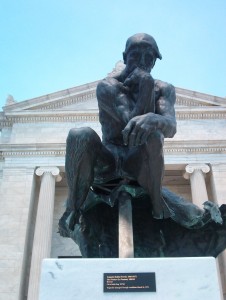If you think about it, nearly everything in life can be problematized. We have the power to scrutinize ideas that are normally left unexamined and unquestioned. If you’re like me, you’ll find this prospect invigorating.
Don’t get me wrong––gratefulness is a large part of the self-revolution. It goes against everything we’ve been taught since we were young, especially in terms of our relationships with material goods. Indeed, gratefulness can open us up to opportunities like college savings and college discounts. But the practices of critical thinking and gratefulness do not have to be mutually exclusive.
You can practice acceptance of certain conditions––for example, the not-so-great material conditions you may face as you pursue the path that you’ve chosen––while at the same time refusing the very basis upon which this idea is founded: that the pursuit of money above all else is necessary for a comfortable existence.
A critical thinker would pause and ask why this has to be.

Do you think as deeply as this guy?
“Hard work” has long been a foundational value of American cultural and political thought. You could say that it’s entrenched in the American consciousness. But if you reflect for a bit, you’ll see that the idea of “hard work” is often used to justify racism, classism, sexism, nationalism, and other forms of discrimination.
The Declaration of Independence is a list of completely subjective statements constructed by a group of individuals interpreting their history in an effort to legitimize the coming insurrection against their rulers. One very famous line that Jefferson uses in the Declaration is meant to stifle critique before even it has the chance to manifest: “We hold these truths to be self-evident…”
This phrase is a perfect example of “one-dimensional thought” in operation. As critical theorist Herbert Marcuse wrote in One Dimensional Man:
“The closed language does not demonstrate and explain––it communicates decision, dictum, command” (101).
Deeming certain principles “truths” and describing these “truths” as “self-evident” without explaining why they are effectively shuts down any possibility for critique. If you don’t believe in what Jefferson is about to lay down, you’re perceived as unreasonable.
How can you question truth, let alone truth that is visible to each and every one of us? C’mon!
The perpetuation of unquestioned ideas is certainly not limited to 18th century political documents. Each of us contribute to this process every single day without realizing it.
Right from the beginning, our education system attempts to suppress the curious and critical tendencies of each child by forcing them to adhere to unquestioned notions and behaviors through standardized tests and rigid modes of teaching.
In a socioeconomic system that relies on a mass of individuals who do as they’re told and not much more, there is a multitude of power in critical thought. Critical thinking works to subvert the blind acquiescence which is a necessary component of the political and economic systems under which we live.
Given the fact that some ideas and methods of thinking are so powerfully entrenched in our consciousness, how can you begin to think critically?
To answer this question, I turn, once again, to Michel Foucault. Foucault described the elements of his moral code as such:
“(1) the refusal to accept as self-evident the things that are proposed to us; (2) the need to analyze and to know, since we can accomplish nothing without reflection and understanding—thus, the principle of curiosity; and (3) the principle of innovation: to seek out in our reflection those things that have never been thought or imagined. Thus: refusal, curiosity, innovation.”
The first step, then, is to realize that some of the truths we accept as “self-evident” are not necessarily so.
We say certain things and behave in certain ways that conform to what we accept as the “facts of life.” These “facts” are, for the most part, accepted by everyone and perpetuated without question.
Questioning these assumptions which are so often taken for granted is a powerful practice. It’s what we must start doing if we wish to radicalize our selves and society.

You can use critical thinking skills to change the direction of your life. Hopefully you'll perform a bit better than this button-hungry parrot.
The third element in Foucault’s list––innovation––depends entirely on the first two, refusal and curiosity. Without rejecting and analyzing an idea that is assumed to be self-evident, it’s impossible to create something new. How can you innovate without moving past the artificial barriers you face?
Critical thinking enables you to be creative, to see things differently, and to define your true values within the midst of a monotonous society that encourages cookie-cutter modes of thought.
Part of the challenge is recognizing the need to think critically. The next part is in applying your critical thinking skills to your everyday life, thereby uniting theory with practice.
Amanda Fox-Rouch (Hunter College)
Follow the Campus Clipper on Twitter and Like us on Facebook!
Interested in more deals for students? Sign up for our bi-weekly newsletter to get the latest in student discounts and promotions and follow our Tumblr and Pinterest. For savings on-the-go, download our printable coupon e-book!

